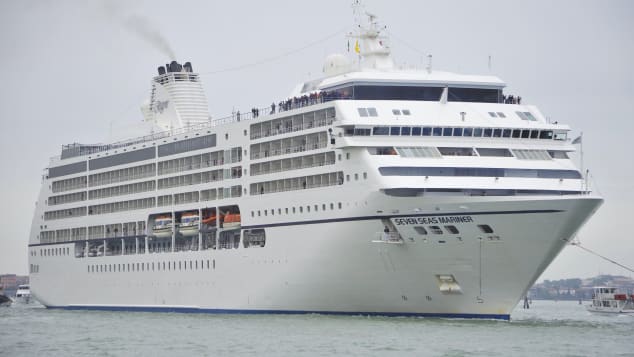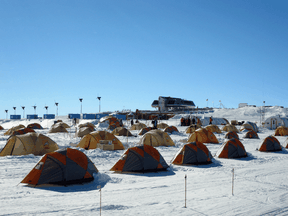COVID? No Geographic Area Too Remote
"The virus that causes COVID-19 spreads easily between people in close quarters on board ships, and the chance of getting COVID-19 on cruise ships is very high [even if people are fully vaccinated and have received a booster].""CDC has issued an Order that requires face masks to be worn by all travelers while on public transportation including all passengers on board and all personnel operating maritime conveyances traveling into, within, or out of the United States. Masks are also required while indoors at U.S. transportation hubs, including seaports and ferry terminals. Travelers are not required to wear a mask in outdoor areas of a conveyance."U.S.Centers for Disease Control"[The decision] is particularly perplexing considering that cases identified on cruise ships consistently make up a very slim minority of the total population onboard.""The majority of those cases are asymptomatic or mild in nature, posing little to no burden on medical resources onboard or onshore."Cruise Lines International Association"We don't like to see even one case, but our experience is a fraction of the comparable statistics of virtually any other comparable location or industry.""Few businesses are subject to such intense scrutiny, regulation and disclosure requirements by so many authorities."Richard Fain, CEO, Royal Caribbean
 |
| The Celebrity Summit cruise ship prepares to depart from Port Miami, Saturday, Nov. 27, 2021, in Miami. (AP Photo/Lynne Sladky) |
"[The spread of the Omicron variant] may shape how some destination authorities view even a small number of cases, even when they are being managed with our vigorous protocols.""Some destinations have limited medical resources and are focused on managing their own local response to the variant [when they refuse a cruise ship entry to their waters and deny docking permission].""Should it be necessary to cancel a port, we will do our best to find an alternative destination,"Carnival spokesperson AnneMarie Mathews
All travellers -- even those fully vaccinated, according to the U.S.Centers for Disease Control -- should avoid cruises. The agency had received reports of 5,013 COVID-19 cases on ships in American waters between December 14 and 29, representing a massive increase over the previous two weeks when 162 cases were reported. Some 91 ships carrying passengers from U.S. waters reported cases in the past seven days that meet the threshold for CDC investigation and recommendation.
Understandably, the Cruise Lines International Association is a trifle annoyed at this intervention and interruption in their tourism business, thriving now, having recovered from the 'floating coffin' era of a year earlier when the global pandemic had just begun its disastrous sweep through the world. It is the cruise industry's focus to offer tourism on a grand scale, each of these monster vessels carrying the equivalent of a fair-sized town to exotic destinations. It is the mission of the CDC to stop pandemics in their tracks -- if at all possible.
Over 80 cruise ships are now being investigated by the U.S. Centers for Disease Control and Prevention, all of which have experienced COVID-19 outbreaks. A new colour-coded system was implemented by the cruise industry and the CDC to help monitor and control virus outbreaks. 85 ships from Norwegian Cruise Lines, Disney, Carnival Corp. and Royal Caribbean Cruise Lines were given yellow flags, triggering a CDC investigation.
A yellow flag denotes that coronavirus cases were reported in over 0.10 percent of passengers; with 6,500 passengers on board a cruise ship; seven or more cases have been diagnosed during the previous week, and yet other cases reported among the liner's crew. 25 ships operated by Royal Caribbean were given a yellow label; one, the Odyssey of the Seas, began skipping ports, heading back to Fort Lauderdale Florida after 55 people on board tested positive for COVID-19.
 |
| The Seven Seas Mariner, Manfred Segerer/ullstein bild/Getty Images |
Should sustained transmission of COVID-19 go on to overwhelm medical resources on board, the CDC will review a ship for proposed red status; none yet have been labelled with a red flag. The alert system of colour-coding numbers of affected passengers applies only to ships sailing or planning to enter U.S. waters. In Canada, Transport Canada banned cruise ships in Canadian waters for a year, a ban scheduled to be lifted in February 2022. Canadians continue to be advised by government to avoid all travel on cruise ships outside the country for the present.
COVID-19 has led the cruising industry to gigantic losses of an estimated $32 billion, aside from the hit to the industry's reputation which suffered from early reports of mass COVID outbreaks, leaving ships marooned with sick passengers, refused entry to ports. In self-defence the cruise industry enacted strict COVID0-19 mitigation protocols with testing, vaccination mandates, enhanced ventilation systems, mask-wearing, physical distancing and other public health protocols.
But COVID-19 is a dangerously sneaky, pervasive, pernicious threat, particularly the Omicron variant. With the best of avoidance protocols in place, the virus eerily turns up in the most unexpected places. While it's easily understood that the virus can proliferate and infect prodigiously as nature permits it to do, in an environment where in effect, thousands of people are sitting ducks on a ship, despite heroic efforts to keep everyone safe, it's a little more difficult to explain how in the most isolated place on the planet, COVID still showed up.
As it did in Antarctica at the Princess Elizabeth Polar Station where two thirds of Belgium's 25 staff have been infected. Despite being fully vaccinated, living far from civilization, polar researchers contracted the coronavirus. None of those infected exhibited severe symptoms. The outbreak occurred despite staff passing multiple PCR tests, quarantining, and living in one of the most remote areas on the planet. It entered with a scientist new arrived, who had been cleared by tests prior to arrival.
 |
Labels: Antarctica, Centers for Disease Control, COVID-19, Cruise Ships, Infections

0 Comments:
Post a Comment
<< Home